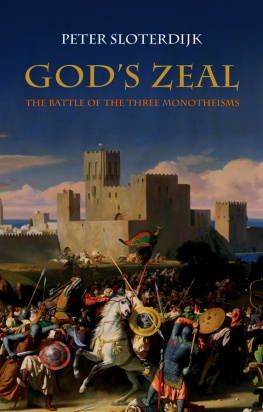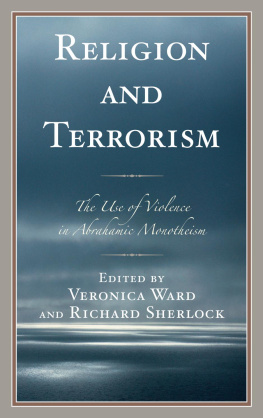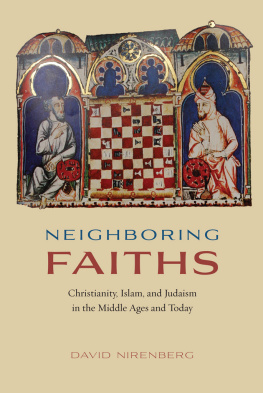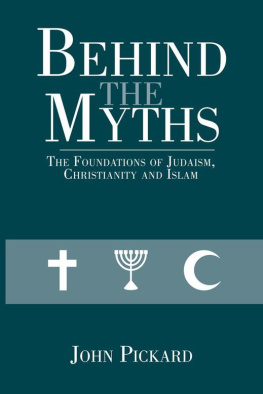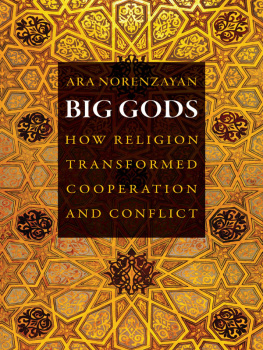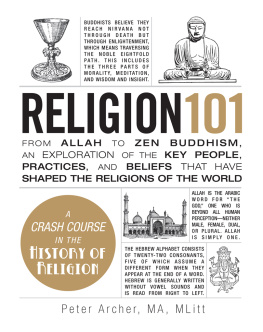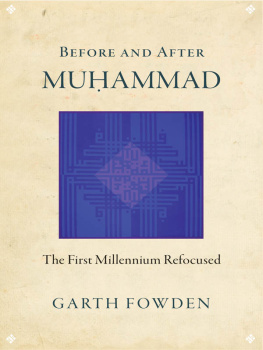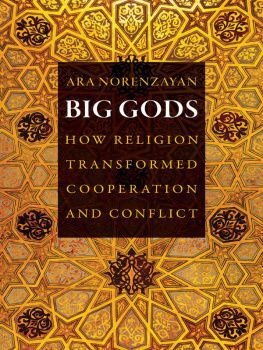
First published in German as Gottes Eifer. Vom Kampf der drei Monotheismen Suhrkamp Verlag Frankfurt am Main 2007
This English edition Polity Press, 2009
Polity Press
65 Bridge Street
Cambridge CB2 1UR, UK
Polity Press
350 Main Street
Malden, MA 02148, USA
All rights reserved. Except for the quotation of short passages for the purpose of criticism and review, no part of this publication may be reproduced, stored in a retrieval system, or transmitted, in any form or by any means, electronic, mechanical, photocopying, recording or otherwise, without the prior permission of the publisher.
ISBN-13: 978-0-7456-4506-3
ISBN-13: 978-0-7456-4507-0(paperback)
ISBN-13: 978-0-7456-9465-8(epub)
ISBN-13: 978-0-7456-9372-9(mobi)
A catalogue record for this book is available from the British Library.
The publisher has used its best endeavours to ensure that the URLs for external websites referred to in this book are correct and active at the time of going to press. However, the publisher has no responsibility for the websites and can make no guarantee that a site will remain live or that the content is or will remain appropriate.
Every effort has been made to trace all copyright holders, but if any have been inadvertently overlooked the publishers will be pleased to include any necessary credits in any subsequent reprint or edition.
For further information on Polity, visit our website: www.politybooks.com.
The translation of this work was supported by a grant from the Goethe-Institut which is funded by the German Ministry of Foreign Affairs.
Dedication
This book is dedicated to Bazon Brock for several reasons. Firstly because, thanks to his reflections on a normative concept of civilization, he provided one of the polar reference points for the thoughts presented here. Secondly, because his seventieth birthday, despite having taken place some months ago, offered an occasion of almost challenging quality. Finally, it was he who provoked the present study through his own personal initiative. The following text is based on a lecture I was asked to give by Bazon Brock and Yael Katz Ben Shalom on the occasion of the opening of the Artneuland gallery in Berlin on 28 November 2006, a venue that thematicizes, among other things, the development of the trialogue between the monotheistic religions in the medium of the arts but also supports the secular exchange between Israelis, Arabs and Europeans. The mixed response to my roughly sketched, rushed oral presentation gave me something of an idea of the difficulties involved in such a project. That experience formed one of the motivations for the slightly slower, more complete exposition of my thoughts I have attempted here.
There is a further reason for my decision to dedicate this text to Bazon Brock. In the summer of 2006, on the occasion of the aforementioned birthday, I had the honour of being invited by Chris Derkon, with the patronage of Hubert Burda, to give a eulogy in the Haus der Kunst in Munich for the artist, art critic, civilization theorist, pedagogue of provocation and performance philosopher Brock. In my speech, I attempted to hold a mirror up to him in order to characterize him through similarities and contrasts with four figures from recent art and cultural history: Marcel Duchamps, Salvador Dal, Joseph Beuys and Friedrich Nietzsche. I took the latter's concept of intellectual honesty in order to ascribe it to the jubilarian in a highly personal sense. In that context, which invited thinking in superlatives, I could take the liberty of making the following statement: My dear Bazon Brock, you will have to put up with my saying that you are the most honest person of our time. On that occasion, I spoke those words in front of an audience that was at the same time a circle of friends. Now I would like to repeat them to a readership that constitutes no more or less than a public.
The premises
When studying the writings of philosophical authors that demand a thorough inspection of one's own discourse, one occasionally stumbles upon paragraphs that are conspicuous because they are obviously not necessitated by the course of a particular idea, but rather stem from a sudden associative urge that interrupts the development of an argument. In Hegel's Lectures on Aesthetics, for example, in the section dealing with the Dutch painters of the seventeenth century, the author includes that now famous reference to life's Sundays meaning those exceptional states of existence relished with such demonstrative sensual enjoyment by the people he depicts. Obviously it is not Hegel the dialectician speaking here, the thinker who knows most of what he knows systematically, rather than simply having picked it up somewhere. In this passage, he is bypassing his logical apparatus and speaking as a descendant of Swabian Protestantism encountering a welcome echo of his youthful impressions in the relaxed indecency of Dutch everyday life. So even if these boisterous philistines from the damp North are anything but saints, they surely cannot be entirely bad people with such good cheer and, when the occasion arises, he will tell the reader this in the manner of a declaration of faith. If one so desired, one could see a hidden doctrine in Hegel's formulation: as highly as we cherish what is wonderful, it is the duty of art to let the commonplace have the last word. Does the value of that trivial Sunday feeling not increase to the same degree that we grow tired of the cult of exceptional states, these continuations of the wonderful by the most extreme means?
To take a much darker example and at the same time a much more current one of a digression that breaks the boundaries of its context in the work of an otherwise highly controlled, even obsessively careful, author, I shall introduce a few lines from a lecture given by Jacques Derrida in spring 1993 in Riverside, California; the extended version was published as a book that same year in Paris under the title Spectres de Marx. There, in a passage that has become notorious since, Derrida gets carried away for a moment and makes the following comment: The war over the appropriation of Jerusalem is today's world war. It is taking place everywhere, it is the world, it is the singular figure of its out of joint-ness today. This eruptive statement can only be understood with reference to two pieces of information concerning Derrida and his context. Firstly, one needs to know that, in order to explore the possibility of the inextinguishable significance of Karl Marx for the post-Communist era, he had embarked on a meditation upon Hamlet's comment the world is out of joint that runs through his overlong deliberations as a leitmotif. Secondly, he engaged polemically with Francis Fukuyama's theory of the end of history (first put forward in 1989, then expanded into the book The End of History and the Last Man in 1992), in which he sees (mistakenly, I would argue) a form of liberal-technocratic evangelism and a somewhat rash, perhaps even irresponsible, version of American triumphalist rhetoric. This marks the start of a torrent of ideas culminating in the passage quoted above.
I shall place that statement by Derrida, who left us in 2004, at the head of the following reflections not as a motto, but rather as a warning sign pointing out a particularly explosive semantic and political danger zone in today's world: the Near and Middle East, where, if Derrida was right, three messianic eschatologies embroiled in rivalry are directly or indirectly mobilizing all the powers in the world and the entire world order for the ruthless war they are waging against one another. I am not sure whether I would like to adopt the thesis of the war of eschatologies unreservedly, and am well aware that it is more an example of dangerous thinking than a stylistically assured philosophical explanation, whether casual or committed. Here, Derrida of all people that author whose reputation is tied to the procedures of deconstruction, the meticulous dissection of metaphysical hyperbole and one-sided discourse used as a means of power indulged in an excursus based around one of the most pathos-ridden exaggerations ever formulated by a philosopher of recent generations.
Next page
